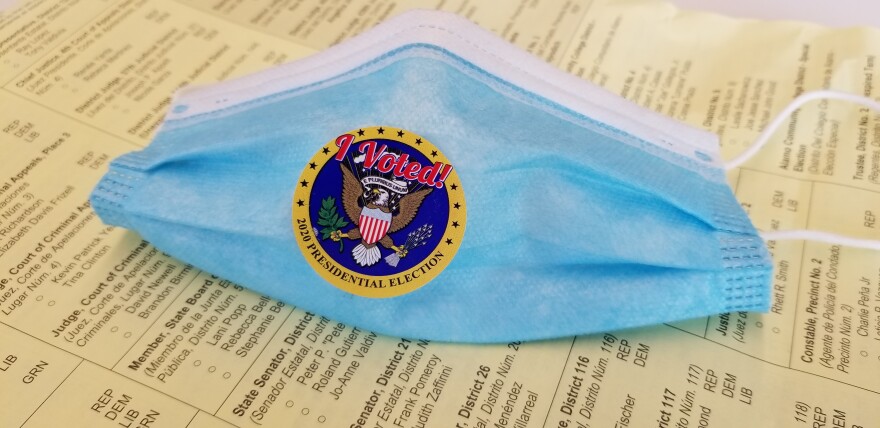On Thursday, the Texas Legislative Committee on Elections met for the first time in the new legislative session. The committee chairman is Rep. Briscoe Cain, a Republican who represents District 128 in the Houston region. Cain made news when he joined pro-Trump efforts in Pennsylvania to reverse the election results there. Now he’s in charge of crafting new elections laws in Texas. He set the tone for the committee, asking for cooperation by quoting a cult classic movie.
“Because this is a passionate subject I ask that we keep the rules of decorum in mind and make this about policy and not personality. Be respectful to each other and to the witnesses. Essentially be excellent to each other, as the great Bill Preston once said while on his excellent adventure with Ted Logan,” Cain said.
In committee testimony Keith Ingram from the Texas secretary of state's office said they have no evidence of anyone having trouble voting in 2020.
“I’m happy to report that Texas elections are in good shape. Last year was very challenging in a number of respects. Obviously presidential elections have the largest turn outs and the most difficult elections that we do. In any ordinary year a presidential election would be a big deal with high turnout and much scrutiny. However, in 2020 there was the added complication of a global pandemic with which election officials had to contend,” Ingram said.
“The elections in Texas last year were a success. The governor extended early voting by a week to spread out voters. And this resulted in, as well as the high level of interest on part of the voters, 87% of voters last year voted early. Notwithstanding the extraordinary turnout, the counties reported their results earlier than normal. In spite of all the circumstances, Texas had an election that was smooth and secure. Texans can be justifiably proud of the hard work and creativity shown by local county elections officials,” he said.
Much of the testimony was focused on how the attorney general’s office is dealing with voter fraud and how that’s become a high priority issue. According the John Reno from the AG's office, in 2019 there were 27 cases opened for voter fraud. In 2020 that jumped to 307. There are about 500 cases pending, and about two thirds of them are related to mail in ballot fraud.
“Part of that may be because we are continuing to get better at investigating and prosecuting those cases. But what we are also seeing, and I think this is important as well, is that the ratio of number of bad actors or defendants to the number of charges that are filed has increased. There used to be more of a one-to-one ratio. It used to have one bad actor, one crime, one offense. What we are seeing now is you have multiple bad actors [and] several more offenses being committed. These investigations are becoming more complex [as] the bad actors who are committing them or continuing to figure out new and different ways to violate election criminal laws,” Reno said.
The Texas League of Women Voters is monitoring the elections committee hearing and watching bills filed dealing with voting in Texas this session. Cinde Weatherby is the Voting Rights Election Law Issue chair. She explained what changes to Texas elections we can expect from this legislative session.
On Friday, Attorney General Ken Paxton announced he is warning U.S. House and Senate leaders of constitutional deficiencies within H.R. 1, the For the People Act of 2021, which would expand voting protections across the nation.
In a letter, Paxton stated that under both the Elections Clause of Article I of the Constitution and the Electors Clause of Article II, states have principal responsibility to safeguard elections.
Paxton claimed the For the People Act would invert that structure, commandeer state resources, muddle election procedure, and erode faith in our elections.
Paxton wrote should HR 1 become law, he will use every possible resource to protect Texas elections, state sovereignty, and the rights of all Texans.
However the 15th Amendment says “the right of citizens of the United States to vote shall not be denied or abridged by the United States or by any State on account of race, color, or previous condition of servitude.” And “the Congress shall have power to enforce this article by appropriate legislation.”
Voter intimidation
In the 2020 presidential election, loud and proud pro-Trump voters became an almost common sight on Texas roads. These so called “Trump Trains” were organized caravans of vehicles, mostly trucks, festooned with Trump flags and other pro-Trump regalia. There were many reports of these Trump Trains being more than a nuisance. At times they were threats to public safety. Now, months later, the question is where did enthusiastic grass roots campaigning stop and where did election intimidation begin?
This week the Texas Civil Rights Project documented instances when Trump Trains in Bexar County on Election Day surrounded polling places, sometimes blocking the entrances and exits to the sites and made voters standing in line outside uncomfortable.
In Fort Bend, a Trump Train that included military style trucks, loud speakers, a bull horn and a coffin were gathered in the parking lot of a polling location.
These instances and others are cataloged in the report "Voter Intimidation in Texas during the 2020 General Election." Emma Hilbert is a lawyer with the Texas Civil Rights Project and helped compile the report.
TPR was founded by and is supported by our community. If you value our commitment to the highest standards of responsible journalism and are able to do so, please consider making your gift of support today.


